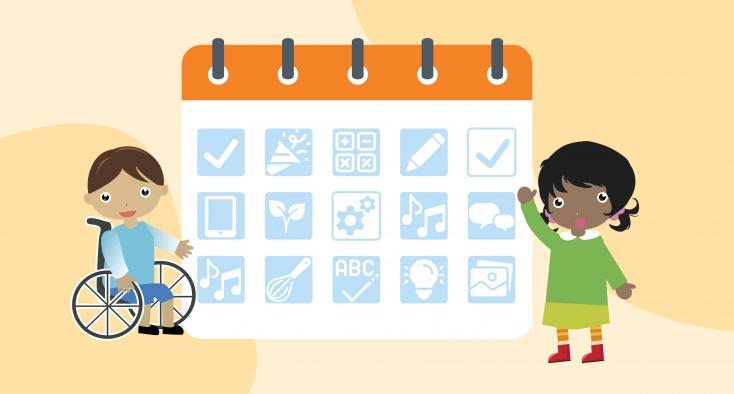Please note: The information provided in this tipsheet is for reference only. It is not intended as a recommendation or endorsement of organizations, news sources, agencies or private businesses, or as a comprehensive resource list.
Based on when you are viewing this tipsheet, the information may not be the most up to date. Please refer to the date this tipsheet was last updated, at the end of the document. You can also access this tipsheet online at hollandbloorview.ca/covid-19-tipsheets
This tipsheet can be used when creating a daily or weekly schedule while at home during this time. In this tipsheet, you will find ideas from other families, and some resources online that can be utilized when creating a schedule for your child(ren).
Tips for families before you start building a learning schedule
Get your child involved
- It can be a skill or ‘just because' they have always wanted to learn in a particular area
- When chatting with your child(ren) take note of a few things they mention or ask questions about. These are great clues in terms of choosing what direction to go in terms of topics to learn about
- For younger children, provide them with choices. Select two things that you know they interested in or that they were learning at school, and give them the choice of which one to focus on that day
- For older children/youth, use current events that you’ve been discussing with them
Goal-setting - make it personal!
- Take a look at their agenda to see what they have been to be working on – offer a few suggestions about what to put on their goal list for the day/week
- On every daily weekly agenda, include some general items that are consistent with what they would do at school every day, i.e. reading, daily physical activity, journal writing/writing, independent play, learning screen time
- Keep these really general and let your child(ren) direct you as to what you want to do
Be realistic
- What is a reasonable amount of time depending on their attention span? 10 minutes? 30 minutes?
- Does your child respond well to a strict time schedule or do they need more flexibility? It’s okay to ‘play it by ear.’ This all depends on what the ‘non-negotiables’ are in their schedule
- Start with something you know your child will succeed in and then move to something more challenging.
- There’s nothing wrong with doing a refresher/review of what they learned a month ago
Make it fun!
- Always Include something specific that your child likes, as part of the lesson plan to get them to ‘buy in’, help them focus and stay motivated.
Know when to take a break
- Read the subtle (or not-so-subtle) clues your child is giving you. If they start to get distracted, maybe it’s time to take a break?
- Kids may have a lot of feelings about the challenges going on and the changes that are happening around them. It is important to acknowledge children’s feelings and take a break from a schedule if needed.
Parent to Parent Tips
- 5 tips if you're in isolation with kids (BethDBlogger)
- Practical reflections on creating a schedule at home in the early days (BethDBlogger)
Online Teaching and Learning Resources
Printable schedules
- Schedules, token boards, resources (EasterSeals School Closure Toolkit)
- The ‘No School’ calendar for download (The Autism Educator)
Curriculum support
- TDSB Student Learning Resources (Toronto District School Board)
- African American homeschool resources (African-American Homeschool Moms)
- Indigenous Elementary, Middle and Secondary School Resources (Indigenous Education Department, Greater Victoria School District, B.C.)
- Daily schedules for students 2-18, remote learning resources(Khan Academy)
- Teaching Remotely for Grades K - 12 (Scholastic Learn at Home)
- Free, Easy Science for Remote Learning (Mystery Science)
- Free Education Resources (Chai Lifeline)
- Math and Language Arts by Grade (IXL)
Speech and Communication
- Activities from a Speech Therapist (Easter Seals)
- Tips for language and literacy skills (Hanen Centre)
- Build Your Child’s Communication Skills - All Day Long (Autism) (Hanen Centre)
Reading
- Ready for Reading: Birth to Age 5 (Toronto Public Library)
- Storybook Brought to Life: Read-aloud, Animated Storybooks (Vooks)
- Online Reading Game (Teach Your Monster to Read)
- TDSB Virtual Library (Toronto District School Board)
American Sign Language
- American Sign Language Stories for Pre-Schoolers (Aunt Alice’s ASL TV)
- Learn Sign Language Online (Sign Language 101)
- ASL Resources – Children’s Books in ASL (Signs for Hope)
Live streaming art, science and music classes
- Arts and Science Lessons on Instagram (Cassie Stephens)
- Lunch Doodles with artist Mo Willems: (The Kennedy Center)
- Flatten the Curve Music Classes with The Arkells (The Arkells)
Film and experiential learning
- Reel Education uses film to explore diversity, disability, accessibility and inclusion. Download films and lesson plans, including activities and discussion questions! (ReelAbilities Film Festival)
- 150+ Educational shows on Netflix (Homeschool Hideout)
- How to create fantasy worlds and bring your ideas to life (Disney’s Imagineer Program)
Google document of activities by a teacher to share with students and their families: Home learning ideas.
There are also activities to do in the meantime that are about COVID-19 or Coronavirus. If you are looking to create your own daily schedule please see our Sample Daily Schedule tipsheet. You can find these ideas in other Holland Bloorview tipsheets.
This tipsheet belongs to a set of specialized resources for the COVID-19 and Coronavirus outbreak period. If you are looking for other family resources that have to do with childhood disability, please visit www.hollandbloorview.ca/resourcecentre.
Created by Melissa Ngo, Lorraine Thomas, Meghan Toswell and Beth Dangerfield at Holland Bloorview Kids Rehabilitation Hospital on March 26 2020. Updated on April 27, 2020.
If you have a question or a resource to share, please feel free to reach out to us at resourcecentre@hollandbloorview.ca.
